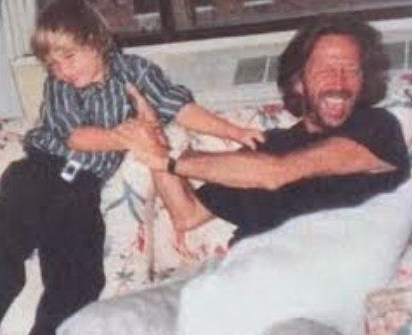Eric Clapton had already endured more trials than most people could imagine. From battling heroin addiction to facing near-destruction with alcohol, Clapton had survived when many of his peers in the music world—Jimi Hendrix, Duane Allman, Stevie Ray Vaughan—did not. By 1987, he had achieved sobriety, a milestone made even more meaningful the year before with the birth of his son, Conor, who became his reason to live and a beacon of hope amid his struggles.
Conor, born in 1986 to Italian actress Lori Del Santo, was the center of Clapton’s world. Although Clapton and Del Santo were no longer together, their love for Conor remained strong. The young boy was the light that helped Clapton sustain his sobriety and embrace life anew.
On a fateful March morning, a simple father-son outing to the Bronx Zoo turned into a tragedy. Conor, only four years old, was at his mother’s apartment on the 53rd floor of a Manhattan high-rise. While the building’s maintenance crew cleaned the windows, one was left open. Excited and unaware of the danger, Conor ran toward it—and fell.
Fifty-three stories.
When Clapton arrived, he was met with an unimaginable scene: emergency responders, neighbors frozen in shock, and a grief too deep for words. Conor was gone. The last words of his son, “See you later, Daddy,” would haunt him forever.
Grief Transformed Into Music
The loss of Conor plunged Clapton into profound grief. Losing a child is a pain that defies comprehension: the birthdays, the hugs, the everyday moments—all erased in an instant. For Clapton, even the solace of music seemed impossible at first.
Yet slowly, music became a channel for his sorrow. Out of the darkness came “Tears in Heaven,” co-written with lyricist Will Jennings. The song wasn’t just a tribute; it was a father’s anguished plea to the universe: “Would you know my name if I saw you in heaven? Would it be the same if I saw you in heaven?”
Released in 1992 as part of Clapton’s Unplugged album, the song resonated worldwide. It won three Grammy Awards and became a touchstone for anyone grappling with loss, giving voice to grief too heavy for words. Clapton performed it for years, each time reliving the pain, until he finally felt it was time to let the song rest.
Turning Tragedy Into Purpose
Conor’s death left an indelible mark on Clapton, but it also inspired a mission. In 1998, he founded the Crossroads Centre in Antigua, a treatment facility for people battling addiction. Through benefit concerts and fundraising, he helped thousands reclaim their lives, transforming his personal tragedy into a force for good.
Clapton’s sobriety, once fragile, became unwavering. Staying sober was no longer just about himself; it was about honoring Conor and ensuring his son’s legacy lived on through acts of compassion and creativity.
A Legacy That Lives On
Now 79 years old, Clapton rarely speaks of Conor, but the love and grief he carries remain. His music, philanthropy, and life choices reflect a journey shaped by heartbreak yet dedicated to hope.
Though Conor’s life lasted only four short years, his impact is immeasurable. Through Clapton, he left behind “Tears in Heaven,” a song that continues to console, inspire, and remind the world that love endures, even in the face of unimaginable loss.
The story of Conor and Clapton is a testament to the power of grief, memory, and love—a reminder that even the briefest lives can leave a lasting legacy that touches millions.
